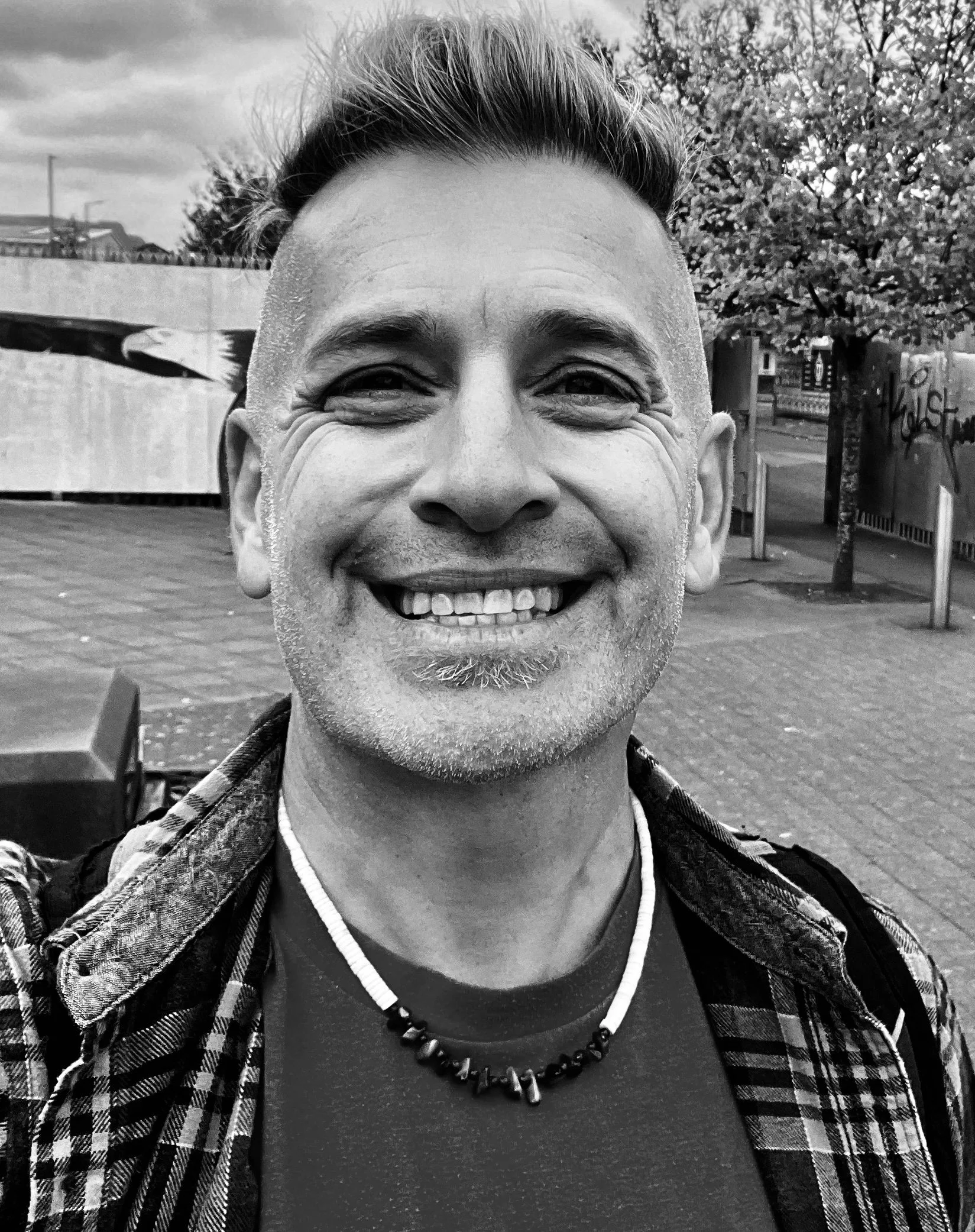From Healing to Calling
Jerry thought his calling was professional baseball until God redirected his path toward music and ministry. What followed was over a decade of preparation disguised as wilderness—financial instability, failed ministries, and growing emptiness despite outward success. When desperation finally broke him open, God's response launched him into a journey of divine appointments and impossible encounters that led to international ministry. This is the story of how God's greatest callings often come through our deepest surrenders, and how the boy who shared Jesus on sidewalks learned that obedience to God's invitations matters more than pursuing our own dreams.
Jerry Fee's story begins as a six-year-old boy playing with Matchbox cars in a friend's kitchen. Born into a family where faith was lived out daily—his maternal grandfather called to pastoring in his forties, his paternal grandfather a worship leader in his youth—Jerry was surrounded by a legacy of Christ followers from the Fee lineage. But it wasn't family tradition that first captured Jerry's heart. It was a miracle.
At six years old, Jerry had been diagnosed with severe scoliosis. During a home group meeting, his parents called him away from his beloved toy cars. "Jerry, we want to come pray for you in the kitchen," they said. Surrounded by adults in what he'd later remember as "the hot seat," Jerry endured the prayer session, his mind fixed on returning to his cars.
Shortly after, a follow-up X-ray revealed the impossible. The doctor, comparing side-by-side images of Jerry's spine before and after prayer, asked Jerry's mother a question that would echo through the boy's life: "You need to tell me what happened." Her response was simple: "The only thing I can tell you that makes sense is we prayed for him, and we believe in a God who can heal.” Jerry never had back problems again.
This wasn't an isolated incident in the Fee household. Jerry's sister was completely healed of Guillain-Barré Syndrome after being paralyzed from the eyelids down and told she would never run or play again. She not only recovered but went on to run track, ride bikes, and maintain an active lifestyle. These tangible miracles created an unshakeable foundation in young Jerry's heart—this God his family talked about was undeniably real.
By first grade, this compelled Jerry to sit on sidewalks, telling his twin neighbors across the street about Jesus. With no theological training or deep scriptural knowledge, he simply knew what he had experienced. “Oh my word, you need to know Jesus," he would tell his friends with the earnest conviction only a child can possess. It was evangelism in its purest form—a boy who had encountered the living God desperate for others to know Him too.
Through his school years, Jerry loved being in church, loved worship music, and felt he was literally standing before God's throne during services. He assumed everyone felt this way and he continued to tell everyone about Jesus, so they could know Him too.
Jerry's plans were crystal clear: professional baseball (the Chicago Cubs) with college ball at Arizona. He had worked relentlessly toward this dream since third grade. But when his family moved to Arkansas, Jerry faced brutal rejection from coaches who made it clear: "You don't belong. You're not from here. You are not going to get on our teams."
Initially angry at this derailment of his plans, Jerry's parents wisely suggested he "check in with God to see what He's up to." This led Jerry to a season of vulnerable questioning: "God, what if this is not your plan for my life? What is? Because I don't have another one." During this searching period, Jerry tried out for a theater class, and when friends suggested he audition for choir despite his protests that he wasn't a singer, he found himself in a pivotal encounter.
After Jerry sang "Amazing Grace" with no training whatsoever, the choir director said, "There's something about your vocal quality I really, really like. I would love to put you in our chamber choir. I'm willing to take flack for this, if you're willing to let me work with you."
The contrast was stark and prophetic: coaches had refused him because he didn't belong; this teacher was willing to stand and absorb criticism because he saw potential. Jerry entered his senior year in choir, memorizing everything by ear since he couldn't read music, discovering a love for the musical environment he never knew existed within him.
It was during this same senior year that Jerry encountered an assignment that would change the trajectory of his life forever. In English class, when tasked with writing lyrical poetry, his teacher's gentle persistence led him to write about a childhood experience—being locked out of his house at ten years old, calling out to God in prayer while sitting in the rain, and finding a door he had checked three times mysteriously wide open with no one home to have unlocked it.
When the teacher read his poem aloud to the class, she began crying, barely able to finish. In that moment, Jerry heard what he describes as "the most audible internal voice I've ever heard"—a tap on his left shoulder and the simple command: "Do that." Jerry knew exactly what God meant, and from that day forward, he couldn't stop writing.
Taking school notebooks, Jerry began filling them with lyrical poems, capturing every miracle and divine encounter he had witnessed. "I've seen God do this," became his driving motivation as he wrote experience after experience—his grandfather's healing, his sister's miraculous recovery, his own spine being straightened, encounter after encounter where he had witnessed the tangible reality of God's power. It was as if a floodgate had opened, and Jerry couldn't turn off this compulsion to document and share the works of God he had seen throughout his young life.
A full scholarship to sing in a university choir led Jerry to Central Arkansas, where his artistic awakening continued to unfold in unexpected ways. During his freshman year in the dorms, Jerry began borrowing guitars from friends on weekends, teaching himself to play by ear. He said, "I would put my fingers around the fretboard ‘till I found stuff that sounded like things I was listening to," creating unconventional chord formations that amazed the guitar players when he showed them what he'd discovered.
"How did you find that? That's not a normal chord form at all," they'd ask. Jerry would simply respond, "I don't know. I'm just exploring." This period became what Jerry describes as a "pressure cooker season"—no one teaching him, just divine guidance leading him to discover music in ways that defied conventional learning.
The compulsion to write songs became so strong that Jerry found himself spending every free moment crafting lyrics and melodies. Jerry felt a growing pull to write songs not just for the church community he knew, but for people who didn't know the God he had experienced. This calling would create a tension that would define the next decade of his life—serving the church while feeling called to reach beyond its walls.
After college, this dual calling led Jerry to Boise, Idaho. When a pastor asked why Jerry had attended their service the previous Sunday, Jerry took a risk: "For the last six months, I know the Lord's been calling me to lead worship. I don't do that, so I don't know what I'm doing, other than I'm just following Him."
The pastor's response revealed God's perfect timing: "That's wild. The guy leading worship Sunday was his last Sunday. Literally, starting this next week, we have nobody."
For over a decade in Idaho's high desert—a detail that would later prove prophetic—Jerry lived this dual existence: serving churches as a worship leader while pursuing his calling to write evangelistic music. This season was marked by constant change and financial instability. Churches would call him for specific seasons of stretching, then God would move him to the next assignment. Band members would come and go when they realized this wasn't about building a music career, but about reaching people who would never step foot in a church.
Through these challenging years, Jerry learned difficult lessons about calling versus convenience. When others would quit, God would remind Jerry: "I gave you the calling. Are you going to obey me when I said you're supposed to do this?" Jerry had to repeatedly choose to continue whether he had support or not, whether it was comfortable or not, whether it made financial sense or not.
But Jerry also recognizes this decade as crucial preparation—God graciously building his capacity and understanding for what lay ahead. During this time, Jerry slowly drifted from his original calling without realizing it. Influenced by advice that "if you really want to make it as a Christian guy, you need to write Christian music for Christians," he began moving away from writing songs that explained the God he knew to people who didn't know Him.
By 2016, feeling incomplete and empty despite outward ministry success, Jerry found himself in an unexpected conversation with his wife: "What if we're trying everything we can here, and this isn't where we're supposed to be? What if God has something for us somewhere else?"
That summer, during the longest tour Jerry had ever attempted, town after town, strangers kept asking, "Have you ever thought about going to Nashville?" The pattern became so pronounced that Jerry wrestled with God nightly: "If this is You, what are You up to? If it's not, shut it down."
Returning home, Jerry entered the most desperate season of seeking in his life. Alone in his bedroom, he would lay on the floor crying out to God: "I will go be an electrician. I'll be a freaking plumber. I will quit pursuing music. Whatever this painful feeling is, I want it to die."
In one of these moments of complete surrender, Jerry heard God speak with gentle firmness: "I'm kicking you out of Idaho. You're like a bird in a nest, and you've been in safety for a really long time. I'm gonna kick you out to fly like I've made you to fly. I'm going to sever your ties, and I want you to go there and trust me for whatever's next."
The severing came swiftly. First, Jerry was released from his youth ministry position. Two weeks later, on the one Sunday in four years he was asked to run sound for an early service, a complaint from a woman he'd never met triggered his dismissal from his main worship position. His pastor wept as he revealed that a group had opposed Jerry from day one, and this incident finally gave them their excuse.
What struck Jerry most was not anger, but recognition of God's sovereignty: "Here's the crazy part—I feel like what a slap in the face to God, because He's been telling me this is coming. If this is the way He chooses to use it, who am I to get all self righteous and upset?"
With their house selling in twenty-four hours and Jerry's tour route mysteriously ending in Nashville with no return bookings available, the Fee family recognized God's unmistakable orchestration. God had literally carved a path from Idaho to Nashville with no way back.
In March 2017, planned to move to Nashville, his family following after three months.
But first, God had one more important interaction for Jerry.
While at a gig at a restaurant in Alamosa, Colorado, a tiny mountain town Jerry had never heard of, he was frustrated and tired, playing acoustically to a mostly inattentive crowd. Jerry focused on one table of six people who were actually listening. When invited to sit with them after his set, these strangers began telling him about the "weird" nature of their town, where people met in impossible circumstances. As they shared their stories, the woman directly across from Jerry mentioned she was from "some small town in Arkansas... Bentonville High School."
Jerry's world stopped. Not only had he graduated from the same high school, but when Jerry mentioned his most memorable teacher—his English teacher whose nickname was "Buffy," the woman who had given him the lyrical poetry assignment that launched his songwriting journey and calling—the woman said simply, "Buffy is my mom."
They had never met during high school, yet here they sat in a tiny Colorado mountain town, brought together through a gig Jerry didn't want in a place he'd never heard of. When Jerry asked God about this impossible encounter, he received a crucial answer: "I needed you to remember why I started you on this journey because of what's coming."
Arriving in Nashville, Jerry began building relationships through video production work. These connections led to an invitation to a meeting where the leader asked everyone to "lay down your dreams and ask God what you were specifically created to do," Jerry received a vivid vision.
He saw himself in a park with a professional stage, artists performing, and ministry happening through both music and personal conversations with people on the fringes. For the first time in his life, Jerry said something that surprised him: "It doesn't even matter if I'm the artist on the stage or not. I could just be a part of this thing. It's not about me."
Jerry began hosting community events combining sports, music, and ministry throughout Nashville. For six months, the vision flourished. But by August 2019, everyone else felt called to step away, leaving Jerry alone with equipment, vision, and no team. For two months, he experienced "radio silence" from God.
At a ministry gathering, a couple presented about the Extreme Tour. As their promotional video played, Jerry watched his vision being lived out on screen—everything they described was exactly what he had been doing and what God had shown him.
Jerry applied to join the Extreme Tour. Five months later, in March 2020, he received a call from Ted, the founder—who had been based in Idaho when Jerry lived there. They had crossed paths multiple times without meeting, and Ted's staff had previously seen Jerry's promotional materials, confused about why someone was "copying" their events.
"You are the first person I've ever sat across the table from who told me what we do, and you've never been on this tour," Ted told Jerry. He made an unprecedented offer: "I'm asking you and your wife to prayerfully consider being staff. This is a massive risk for all of us, but I feel like the Lord's in this for something bigger."
Jerry joined the Extreme Tour staff and has spent the past five years doing exactly what God showed him in that park vision. Through Love Done Loud, he travels across the United States and UK, hosting events in communities where people feel overlooked and unseen. The ministry's approach mirrors what Jerry experienced as a first-grader with his twin neighbors: going to people where they are, sharing the reality of Jesus with those who won't walk through church doors.
Reflecting on his journey, Jerry recognizes that every significant step has come through invitation rather than his own ambition. He acknowledges having no authority when he walks into ministry situation. Looking back on Idaho's high desert—both literal and metaphorical—Jerry now understands it as essential preparation, his "desert season" where he was tested and prepared for the international ministry he now helps lead.
At his core, Jerry remains the same six-year-old boy who sat on a sidewalk telling his friends about Jesus. His message has never changed: "Jesus, man, He is real. He is everything He says He is." Jerry's story demonstrates that God's calling often comes not through our plans and ambitions, but through our willingness to say yes to invitations we never expected.






